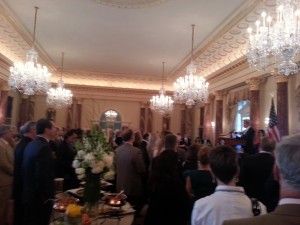March 6, 2014
Dan Cohen on the DPLA’s cloud proposal to the FCC
I’ve posted a podcast interview with Dan Cohen, the executive director of the Digital Public Library of America about their proposal to the FCC.
The FCC is looking for ways to modernize the E-Rate program that has brought the Internet to libraries and schools. The DPLA is proposing DPLA Local, which will enable libraries to create online digital collections using the DPLA’s platform.
I’m excited about this for two reasons beyond the service it would provide.
First, it could be a first step toward providing cloud-based library services, instead of the proprietary, closed, expensive systems libraries typically use to manage their data. (Evergreen, I’m not talking about you, you open source scamp!)
Second, as libraries build their collections using DPLA Local, their metadata is likely to assume normalized forms, which means that we should get cross-collection discovery and semantic riches.
Here’s the proposal itself. And here’s where you can comment to the FCC about it.












